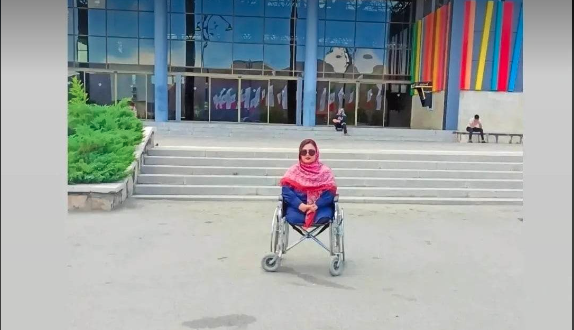Kurdshop – There are many obstacles in Kurdish society, especially those created by the occupation are the main obstacles to the development of the level of thinking, intellectual, economic, and social in general. The occupation does not allow any progress in Kurdish society and prevents any kind of development. Even the level of education, science, and economic development in Kurdistan is becoming the biggest threat to themselves and for this reason, they are preventing these developments in many different ways. In other words, the invaders of Kurdistan see regress, poverty, and exclusion of Kurds from science and any kind of development of the modern world as the best guarantee for the continuation of their power in Kurdistan, and this is true. These obstacles are created by the enemy; we can understand them and we know that the enemy can cause all kinds of harm to Kurdish society and that is for their benefit. But the worst obstacles are those accepted by Kurdish society, which define closing the door to the world around us and regressing as a way of life. That is the biggest danger.
Of course, we can say that the struggle of the Kurdish people in all four parts of Kurdistan is a rejection of the criteria of the occupiers. Kurdish society has changed to a good extent and the Kurds have begun to adapt to the contemporary world to a significant extent. But we can say that we still have a long way to go because the criterion is the existence of an occupation of Kurdistan and that occupation has not been over yet.
One of the biggest obstacles in Kurdish society in the past was the education of girls. Now that obstacle has mostly disappeared. However, one of the main obstacles now is the obstacle facing people with disabilities and not seeing them as people with social status. In other words, there are many obstacles to their education, their participation in daily productive life, their educational opportunities, and their participation in the business market. They are seen as disabled and said they have special needs and cannot do anything, and that is very wrong. Because people with disabilities can also be thinkers and the greatest productivity is built in thinking. They can also participate in production in the economy, but most importantly, they must not be limited in thinking.
One of those who has ignored the obstacles and has been able to participate in the production on her own is a Kurdish girl called Fatima Balkhakanluyi, who has now set up a clothing workshop and gives unemployed people the opportunity to work with her. We have interviewed this Kurdish girl on this subject and her words are very interesting and important.
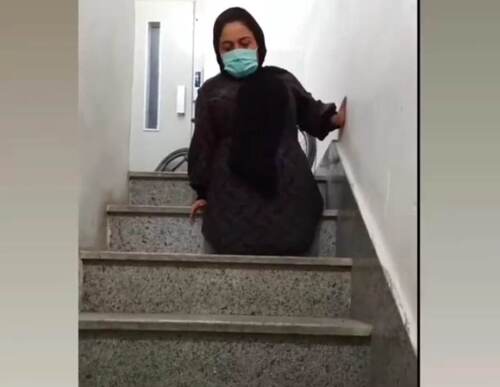
Kurdshop: I would like you to introduce yourself to our readers.
Answer: My name is Fatima Balkhakanluyi. I was born in 1995 in the village of Adakhan near Maku and grew up in my village.
Kurdshop: How did you start your studies and how did you graduate and get to university?
A: My studies were difficult for a while. Since I had special needs, the principal did not allow me to go to school and study; so I had to start school in a school designed for illiterate adults and elderly people. My mother's work was very important to me because I did not have a chair to sit on. She took me to school in a handcart without feeling any fatigue. Springs, summers, autumns, and winters made no difference to her. I continued my studies in this way for several years, but I could not continue my studies among my peers. One day when the governor of our city, Suleiman Jafarzadeh, visited our village, I told him that I wanted to continue my studies, but the principal of our village school said that I could not come to school. With the help of Suleiman Jafarzadeh, whom I thank, I was admitted to the school and continued my studies in the fifth grade. I studied in the village for four years and in Poldasht city for three years. I was later accepted into the medical department after the tests; however, due to the difficulty of traveling to another city, I chose to study accounting in my hometown and received a bachelor's degree in accounting from the Azad University of Maku.
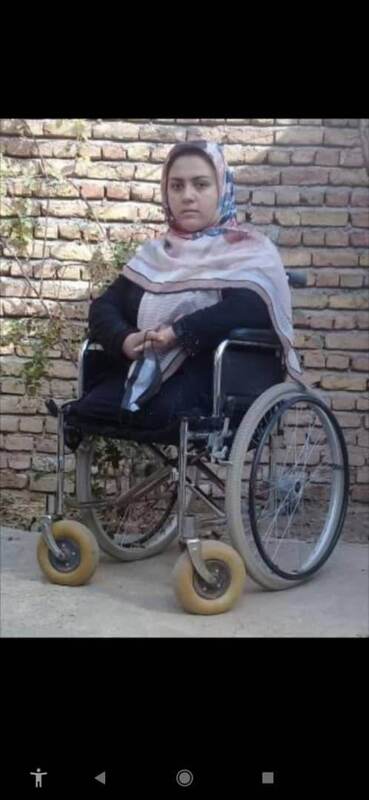
Kurdshop: When did you start working, how did you decide to choose this job, and where is your work center?
A: Before I answer you, I would like to mention one point. Before I graduated, the administration and officials in our city were very helpful. After graduation, I often looked for jobs in many places. Because my major was accounting, I got jobs in many places, but the problem was that I could not work there. Many people offered me different jobs and helped me too, but I decided to do such a thing and told myself that my work should be useful not only for me but for many others.
In particular, I wanted women to be able to benefit from my work. Of course, I have spent a year preparing and planning for this. Because our family's financial resources were very limited, and our father was old, I could not start this project. In order to start my work, I asked for help from our donors in Urmia, Maku, Salmas, and Poldasht so that I could start my project. They helped me. Of course, Mr. Alan Mamadi, who is from Salmas (Dilaman), started the “Long Live Humanity” campaign to raise money for my project. Thankfully, we raised enough donations within a month and I started work by providing a building for the workplace and opening our workshop with 2 sewing machines. I also thank our Kurdish people who are still helping me and do not leave me alone. Our workshop is now running with 8 sewing machines and 20 female employees. Now we are sewing for Tehran. Of course, I want to sew in Kurdistan, that is, in Kurdish cities, and serve my people.
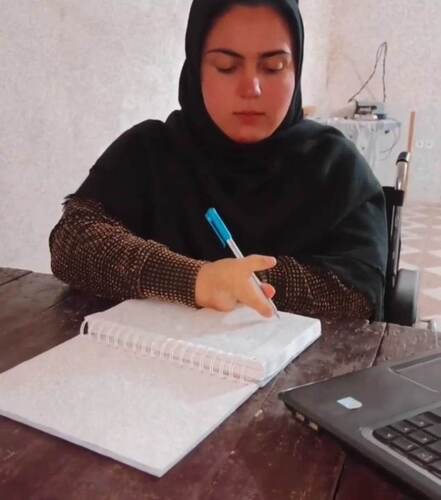
Kurdshop: You said you are currently sewing for Tehran. Do you sew Persian or Kurdish clothes? Does Tehran ask you to sew clothes for them?
A: We also sell Kurdish clothes. In addition to women's Kurdish clothes, there is a lot of demand for men's clothes. Now we are sewing for people, but I want to cut and sew myself. I would like to do my own thing, produce, and sell. But unfortunately, we are now working for the stores in Tehran. They send us their fabrics and we sew for them; that means we only receive money for sewing. The most important part of our work is collecting Kurdish men's clothes. In the two years we have started, the demand for Kurdish men's clothes has increased, which was almost extinct in our region; but as I mentioned, we cannot buy and cut our own fabric due to budget constraints. Now we only sew on request. Despite all the financial difficulties, we work day and night and hope to grow our business.
Kurdshop: When you started a project like this, how did society see you? How did they approach you? Also, how supportive was your family of this?
A: When I started this business, my parents were very supportive of me and my sisters. My mother in particular always knew I had many needs even during my childhood and was very helpful. When people told my mother that her children were not educated and that there was no way for Fatima to succeed in this situation, she ignored them and brought me to this level. My sisters were also very supportive. Although there is a weakness in our society in terms of giving priority to our daughters, my family did not stop me from achieving my dreams. Of course, the help and support that our society, our people, gave me, they may not have given to their own children and they still do not leave me alone. Through this work, we also help women who are without guardians. If possible, we take them to the workshop to work there. If they cannot come to the workshop, we buy them sewing machines. As a woman, I am very happy to do this kind of work.
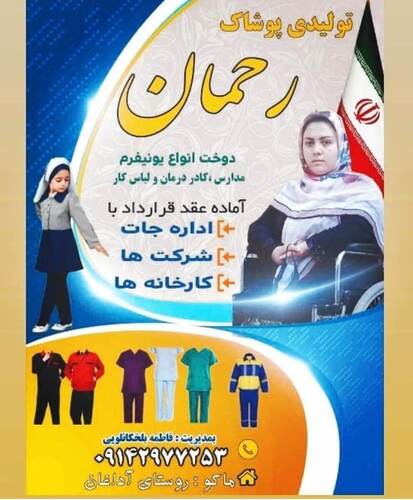
Kurdshop: Where do you work now?
A: Now, since we have only one factory, it is in our village. We try to open other branches in different locations and the city centers when we have enough budget.
Kurdshop: Do you design your work, such as Kurdish clothes, both women's and men's clothes? Have you ever had a similar idea?
A: Yes, I see this strength in myself and I see myself designing clothes. Although I had very little love for sewing when I was a child, I was surprised that I had this art that I had never experienced before. Now our profit is just enough for workshop needs and I cannot do the design work, but my employees and I hope to reach our best performance.
Kurdshop: At the end, what message do you want to send and what are your recommendations to others?
A: I always say we come into the world once. Even though I am disabled, it has never been an obstacle to me and never will be. That is why we have to improve ourselves, learn, be confident, have a strong will, and continue with our work, our desires, and our dreams. Use the opportunities our families give us to grow ourselves rather than mislead them. Our parents should also pave the way for their daughters and give them opportunities to grow. In our society, women should be given opportunities to advance themselves and their work should be respected.

